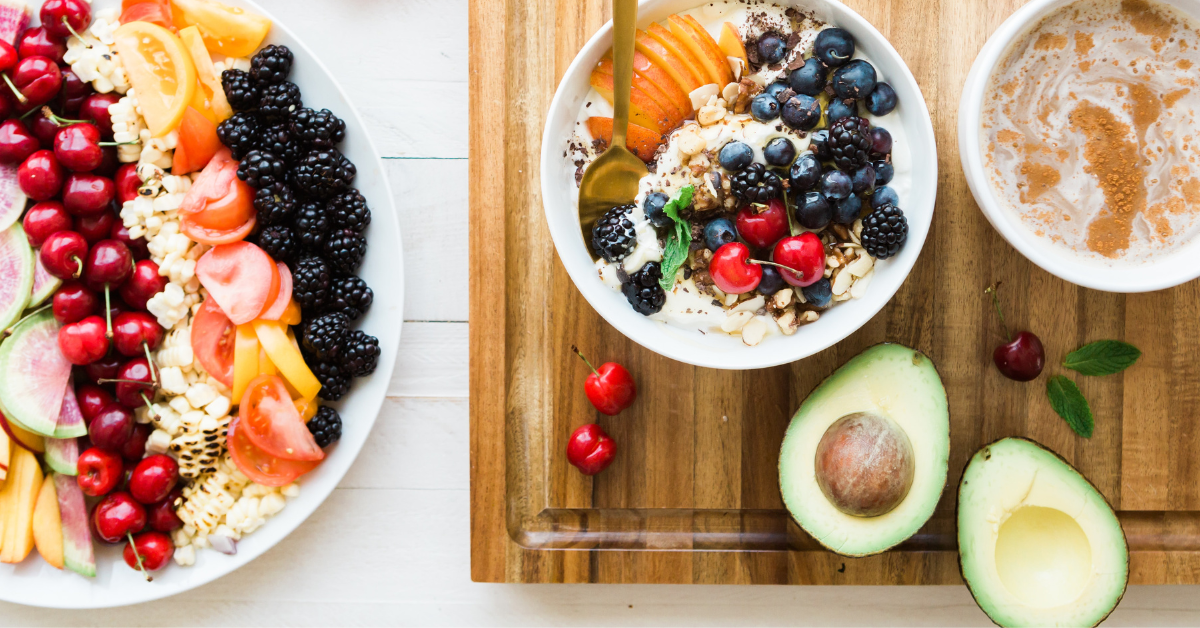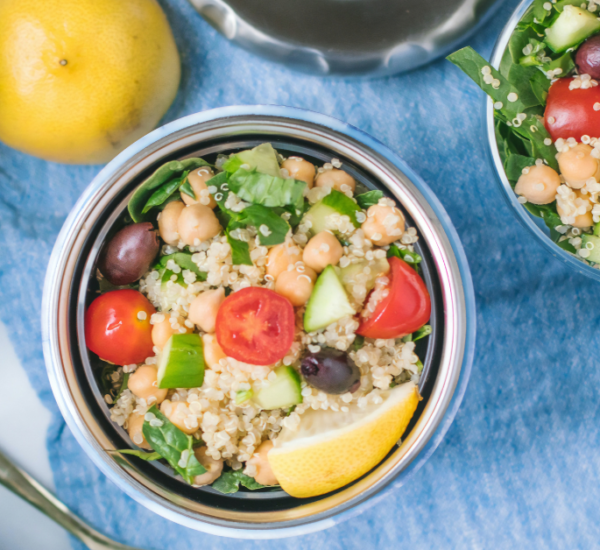Diet tips: they’re everywhere – some good, some bad and some downright crazy. Dietitian Chantelle Curtis-Latchford is here to debunk 10 common diet tips, many of which sound sensible, but are actually the opposite!
1. All calories are equal
Not all calories were created equal. It sounds like a simple concept, but there are so many factors at play when you’re eating food: 100 calories of chocolate and 100 calories of broccoli do very different things to your body. Different foods have different effects on hunger hormones, use different amounts of energy to digest and utilise the nutrients you’re consuming. For example, higher-protein foods keep you feeling fuller for longer so you don’t need to eat as much.
2. Avoid carbs at all costs
This is a big myth. Carbs are essential for your body to function optimally. The quality of carbohydrates is what matters: whole-grain, low-GI carbohydrates like quinoa are digested much more slowly and keep you fuller for longer compared to low-quality carbohydrates like those found in cakes and biscuits. Focus on including the best sources of carbohydrates from low-GI whole grains as a regular part of your day.
3. The fewer calories the better
Going too low is NOT the answer!! Eating much less than you need will put unnecessary stress on your body and it may go into starvation mode. The human body is very clever and has adapted to survive through periods of famine. By maintaining an extremely low-calorie diet, each time you eat, your body will more likely store the energy from food for later use as it won’t know when the next meal is coming. This doesn’t lead to maintained weight loss results.
4. Fat makes you fat
Also read: What Exactly Does 200 Calories Look Like?
5. It’s good to skip a meal
Banking your calories for your next meal won’t work. If you skip a meal you’re more likely to make unhealthy food choices as the day goes on. Skipping lunch to save your calories for a special dinner will only leave you starving and more likely to over-eat at dinner time or snack on unhealthy foods while you wait. Often you’ll consume far more calories than you would have eaten at lunch in the first place.
6. Go sugar-free/raw/paleo for the best results
Health fads like going Paleo, ditching sugar or eating only raw foods often lead to results because you’ll cut out all the junk food in your diet and start eating more fresh and whole foods. Cutting out junk also cuts out a lot of unnecessary calories, so any weight loss is often due to this. You don’t have to follow the strict rules of going sugar-free, raw or Paleo to see results. Simply cut out the junk and processed foods.
7. Ditch the gluten
Unless you have coeliac disease or are gluten intolerant there’s no advantage to going gluten-free. Weight loss from going on a gluten-free diet is often because you’ve cut the breads and cereals food group and you’re eating fewer calories than usual, which will lead to weight loss – it’s not because you’ve cut out gluten. Cutting out food groups can lead to nutritional deficiencies. If weight loss is your goal it’s much better to focus on your portion sizes instead.
8. Juice to drop pounds
Drinking your calories is not the answer. Going on a juice detox will result in initial weight loss as you’ll be eating and drinking far less than usual. As soon as you stop though, your weight will return to normal. Apart from not being nutritionally adequate, drinking your calories will not keep you full and you’ll likely be very hungry.
Juicing often removes the best parts of the fruit (the skin and the pulp, which slow down the absorption of the fruit’s sugar) and can also contain far too many pieces of fruit. Remember, it’s recommended you eat two serves of fruit a day, while a juice can contain the juice (and sugar) of six pieces of fruit – or more! Fruit is naturally high in sugar so you’d be taking in a lot of unnecessary calories, and drinking too much of it may lead to dental erosion too.
9. Cut out dairy to cut calories
I hear a lot of people say they’ve cut out dairy when they’re trying to lose weight. They’re always surprised to hear that dairy can actually help weight loss and reduce body fat. Dairy is one of the richest sources of calcium around, and if you can tolerate it you should include three sources into your day. This might be milk on your muesli, a small tub of yoghurt and two slices of cheese as a snack.
10. Skip breakfast to lose weight
They say it’s the most important meal of the day for a reason. Breakfast kick-starts your metabolism after fasting at night. Breakfast eaters have a healthier weight and more nutritious diets than people who skip breakfast. Skipping this meal makes you more likely to snack on unhealthy options throughout the day. So the message is clear: don’t avoid the most important meal of the day!
If you’re looking for a real, sustainable way to lose weight and get your health back on track, check out our range of weight-loss programs that don’t compromise on food (or fun, for that matter!).
















Love the look of your new transformation companion. When will it be available for Android
Hi Marni – Thanks! Unfortunately at this stage we do not have plans for an Android-friendly app. However, all the 12WBT program features are available on your mobile, tablet and computer by entering https://go.12wbt.com/login into your browser.
All the best,
Leila
12WBT Support Crew
Chantelle,
I recall a song from the 70’s where part of the chorus went…. She’s got it, yeah baby she’s got it…. well you’ve got it!!!
The advice is absolutely correct. And Ruth’s idea of putting it on a billboard is fantastic. Something I’ve learned recently from a Qualified MD with an interest in health and nutrition is that it’s the bodies inability to metabolise Fat that causes diabetes; and too much sugar is the primary cause that makes you fat. Imagine if we could add that to her billboard too. Obviously these things are not the whole story but it is helpful to understand as much as is possible. Understanding is a key to change.
I’ve been trying to lose weight off and on since I was 13 years old. Even went to weight watchers not once but at FIVE different times since I was 17yrs old and gave up every time because the goal was too far away and seemed like a Herculean task. Small goals, small steps, positive self talk like; I can do this… one thing, just for me… because I am worthy of the time It takes, to take care of my good health. When I am in good health I am happy. When I am happy people around me seem happy too.
I was away visiting my son and family for a few weeks and my husband started the 12WBT programme.
When I came back I just ate what he ate…mostly. Sometimes I did my own thing…that was until I got the hang of it and started to miss a few hundred grams here or there.
Then I noticed on the days I ate exactly what the menu stated and nothing more and drank all the water faithfully, even though I did No exercise I was getting lighter. ( I refuse to use the Lsr word as that is how I’ve thought about myself for so long) Incidentally, I am a bright, unique, grandmother who is in the process of reaching toward achieving a major life time goal. I am lighter by 13kgs and it was really easy to do. I’ve about maintained my current number 106.05 kgs for the past four weeks but that’s because I got off track doing some baking…..actually, doing the baking wasn’t the problem….I’m embarrassed to say, I ate most of it too. However I am back on track again and I love how soft and spongy my stomach is feeling again; oh and also how there’s less of it sitting on my lap. I guess I will end up with lots of saggy baggy skin by the time I reach a normal Body mass with a waist under 34 inches. I think I’d rather have the saggy skin than the bulging tummy. I was 19+kg with a 56 inch waist in February this year. My waist today, Nov 4th 2015 is currently 50.5 inches. The smallest I can remember it being is 38 inches when I was 17yrs old. To get back to that seems a lifetime away but just to see the numbers heading in the right direction is a wonderful blessing and I thank Michelle and her team ( and my husband for joining 12WBT) for the programme that may well save my life and get me out of pre-Diabetes without ever getting to Diabetes.
I haven’t prepared for the programme as some do…i.e… in the way Michelle suggests; but remember this, what I have done before has in a way prepared me already. I just jumped in at the deep end and began because I’ve seen the results of Michelle’s team’s work each time I’ve watched an episode of the Biggest ummmm Hardest/Smartest working Downsizer!!!!
Cheers team, Cheers Michelle ‘
Thank you all so very much.
Your appreciatively
Diana B (NZ)
I”m getting married in 5 months so trying to lose weight slowly by exercising more and cutting portions. Unfortunately, falling in love made me fat! I wanted to get some suggestions from you on how to get those last few kilos off, and having amazing arms for my strapless dress.
Hi Bec,
Oh how exciting that your wedding is just 5 months away. We love that you are taking a sensible approach to this and by exercising more regularly and reducing your portion sizes – that’s perfect and will get you the results you’re chasing PLUS have you able to maintain them once you’re married. Aim to eat mostly unprocessed/minimally processed foods (think fresh fruit, veggies, nuts, seeds, legumes, lean meat, natural dairy products, wholegrains, etc.) and incorporate a variety of exercises into your week – cardio, resistance and core/flexibility! For more information, check out http://www.12wbt.com. All the best for an amazing big day! 🙂
Leila
12WBT Support Crew
terrific myth busters! Excellent list to refer to when anyone tries to put you down and say you should do this or that!
Oh dear! I’ve been guilty of cutting out dairy for the sake of calorie sacrifice. I guess no more long-blacks for me anymore.
Thank you Chantelle! I’m sending this article to all my mates with strange nutrition and diet ideas. They won’t listen to me but then I’m way less qualified to talk on the subject than you are.
At Last! Some common sense! I have avoided diets and exercise programs aimed at losing weight because I felt they were a trap, leading to a permananet need to “go on a diet” to maintian a healthy weight once reached. Reading this has given me hope I have found the right place for the info I need to lose and maintain a healthy weight and fitness level. 🙂
I’m a GP and i’m thrilled to see such practical and scientific healthy eating advise! I have so many patients that bank their weight goals around misconceptions about food and eating, and the concept of “dieting”. It is so refreshing to see such a practical and realistic approach – not to mention healthy and medically safe. Thanks!
This will help block the doubts when people are giving me free advice on the so called perfect way to loose weight.
Words of wisdom! So good to hear as I had fallen victim to at least one of the above fads in the past. I’m happy to report that I did the 12WBT. Not only did I lose weight but I kept it off by following your tips. I found it a much more reasonable and balanced approach to leading a healthy lifestyle that has given me the long term results I had always wanted. Awesome!
What about a kilo of raw peanuts per day accompanied by 5 litres of milk per day for a male small build, body builder, in his 40’s. Now in his late 60’s and still a small build fit bloke.
What a wonderfull explanation I hope a lot of young people do read this as one lady says can we have all this on a Billboard so much good could come out of this Thank you
Hello, I just would like some sound advice for us oldies. I put on 15 kgs after an accident.Up until my accident I was on the go all the time running my own business and home like a well oiled motor. besides being on several committees. I was afraid of falling so didnt walk as the fear of another break scared me so much. I ate more and now at 67yrs old I am very infit very over weight and need advice as to how to get this blob back into shape. I get breathless just walking up the street now. My blood pressure is great but I need to get back into some sort of shape or i fear my health will decline. When younger I played A grade comp squash, tennis etc, and I felt great. Please help me to feel that way again.I know i could never get back to those levels but i also know I can look and feel better about myself. HELP
Hi Sue,
We’re so sorry to hear to hear about your accident and I can imagine that this truly would’ve knocked your confidence.
Firstly, it’s important to understand that weight loss is 80% nutrition, 20% exercise so even if you were unable to exercise, as long as you follow our 12WBT Meal Plans, you would still lose weight!
Here at 12WBT, we offer several programs that I think would be of great benefit.
The Move program is the entry level program for 12WBT. The exercises in its Exercise Plans are all low impact and low intensity, and the Fitness Program itself is comprised of 4-5 days of exercise rather than 6. The Move program is the perfect program for those people who have never exercised before, haven’t exercised in a long time or who have injuries and/or health concerns that requires them to introduce a fitness routine very gently.
The Move 2 program is a direct step up from Move. It has slightly longer and more challenging training sessions but remains as a low intensity program with the option of ‘picking up the pace’ towards the end of the Round. Move 2 is comprised of 5 days of exercise per week. It is the perfect lead into the Beginners program.
The Move programs’ Meal Plans have a higher recommended daily calorie allowance than our other Weight Loss programs (1800 calories per day for women and 2000 calories per day for men). They have been designed to be an achievable entry point into following a calorie controlled way of eating.
You sound as though you have had an amazing sporting background and your health and fitness have always been a priority. You will be surprised by your body’s muscle memory and it certainly won’t take you long to create a routine that suits you, has you feeling fitter, less breathless, gives you greater confidence and has you looking fantastic.
We would love to have you joining our 12WBT family so we can help you create the best version of yourself!
Fantastic advise. I am a diabetes educator and predominantly work with Type 2 diabetes. All the fad stuff is pretty full on. This is great advise.. Thank you
Can we please paint this on a blimp or billboards or whole page paper & magazine ads? Thank you for being reasonable. Love your work!! Cheers!